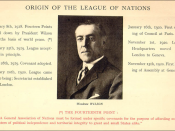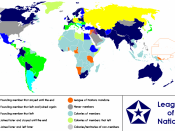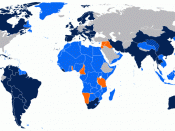The 1920s were the greatest years of League of Nations; they accomplished many successes such as freed 200,000 slaves, cured lethal diseases, and stopped conflicts between countries that had a possibility of causing war. Stopping conflicts was one of the most important things the League did during the 1920s, the action gave the weak, exhausted world after World War One a chance to repair back to its original state, but the method the League of Nations used to solve conflicts between two countries was really unfair, the actions in Corfu and Bulgaria were great examples to explain the League's unfairness. Italy invaded and took control of Corfu, an island owned by Greece in 1923 with the reason of an Italian general being murdered there, Greece asked the League of Nations for help but ended up by paying and apologizing to Italy. In 1925, Greece invaded Bulgaria with the reason of Greek soldiers killed in Bulgaria, but they didn't get treated like Italy; Greece was ordered to leave Bulgaria when Bulgaria asked the League of Nations to help.
The two examples above were the most well known conflicts that the League solved during the 1920s, but they didn't just help the League gain reputation even they were successful, they also made the League lose reputation due to their unfairness.
The actions in Corfu and Bulgaria helped the League of Nations gain reputation during the 1920s because they were one of the few cases the League solved successfully. Nevertheless they showed how arbitrary and unfair the League could be; the two incidents shows the world that the League of Nations can actually stop wars by "negotiating" instead of performing military actions, they made the League more trustworthy. These actions helped the League gain trust with two different types of countries in two different ways: the strong and wealthy countries would trust the League of Nations because the League would give them the benefits if they get into a conflict that involves a weaker country, and the weak countries would trust the League because the League can get them out of conflicts against strong countries, even though sacrificing would be necessary most of the time.
The two actions diminished the reputations of the League of Nations because the way they were solved was just too unfair towards the weaker countries; when Italy attacked Greece, they were treated as if they were the ones being attacked, just because Italy had power, but when Greece did the exact same thing, they get blamed and punished cause of their lack of power and wealth. This unfairness made the League lose a great quantity of reputation towards countries that were weak but proud; they rather have war than to be insulted by the stronger countries and the "laws" of the League of Nations.





